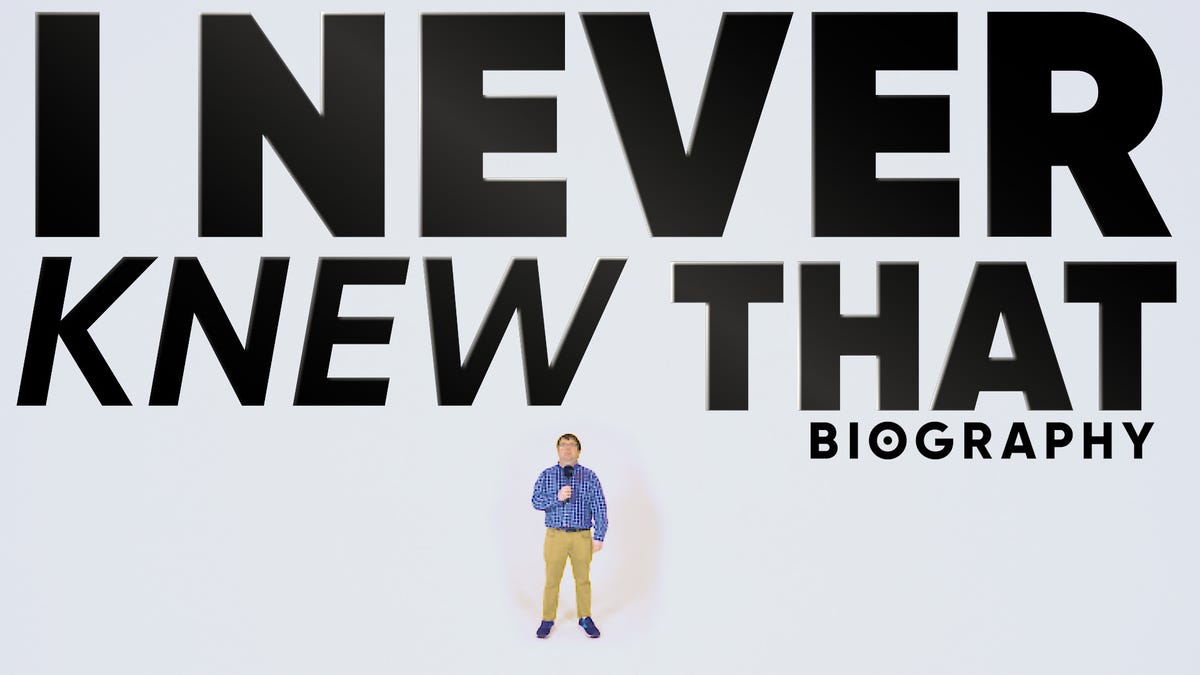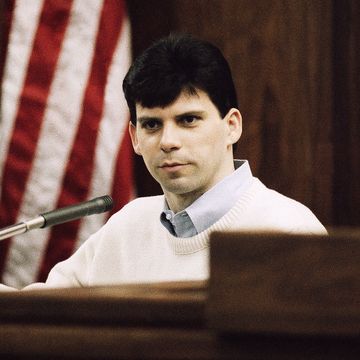For the first time in almost 30 years, convicted killers Lyle and Erik Menendez have spoken together about the 1989 murders of their parents, José and Kitty Menendez, and what transpired after.
The infamous brothers provided joint audio interviews for the new documentary The Menendez Brothers, which released Monday on Netflix. Directed by Alejandro Hartmann, the film examines the events surrounding their arrest and subsequent trials, which captivated the entire country.
Lyle and Erik are currently serving life in prison without the chance of parole. They were convicted of first-degree murder in 1996 for the killings of José and Kitty, though they claimed they acted in self-defense after experiencing years of alleged sexual and physical abuse.
The documentary arrives amid the popularity of Monsters: The Lyle and Erik Menendez Story, Netflix’s nine-episode dramatized recounting about the brothers and their crimes that stars Nicholas Alexander Chavez and Cooper Koch. The real Menendez family has been been highly critical of the hit show, with Erik calling the series a “dishonest portrayal of the tragedies surrounding our crime.”
So with a chance to set the record straight, what did the brothers share? Here’s a look at some of the biggest revelations from The Menendez Brothers.
Erik was ready to confess the night of the murders
Lyle and Erik killed their parents on August 20, 1989, and reported their deaths to police. Investigators didn’t consider the brothers as suspects, and they weren’t arrested until March 1990 after it was discovered Erik had confessed to his therapist, Dr. Jerome Oziel.
However, Erik revealed in the documentary that he was immediately “shell-shocked” by the murders and likely would have confessed the same night if investigators had examined him thoroughly. The siblings had no alibi, he said, and there were shotgun shells in his car, which authorities never searched.
“The gunpowder residue was all over our hands. Under normal circumstances, they give you a gunpowder residue test, and we would have been arrested immediately,” Erik said. “And if they would have just pressed me, I wouldn’t have been able to withstand any questioning. I was in a completely broken and shattered state of mind.”
An original theory was that the Mafia had killed José and Kitty, but prosecutor Pam Bozanich—who had a prominent role in the brothers’ first trial—suggested that responders failed by not identifying Lyle and Erik as suspects. “Statistically, if you have a domestic homicide, you would be an idiot police officer not to consider other family members,” Bozanich said.
Erik is adamant he loved his mother and father
The Menendez Brothers examines how Lyle and Erik eventually formed their defense with attorneys Leslie Abramson and Jill Lansing, who argued the young men killed José and Kitty out of fear their parents would kill them first for revealing their alleged abuse. Both lawyers declined to be interviewed for the documentary.
While prosecutors insisted the brothers murdered their parents for financial reasons, experts for the defense team were entirely unconvinced. Famed criminologist Ann Burgess interviewed Erik and asked him to draw pictures of the crime and the week leading up to it. He drew more than a dozen frames, some of which are shown during the documentary. “It was a mini-Rorschach, I guess you can say, to have him draw it out, and I think it was helpful for him to be able to put it on paper because he hadn’t really talked about this,” Burgess said.
At this point, Burgess ruled out needing money and getting revenge on their parents as possible motives. “I did talk to Leslie Abramson, of course, and I had said there has to be something going on in the family for this to have happened,” she said.
Eventually, both brothers revealed the scope of their claims of abuse and testified about them in court. Despite the shocking allegations and the facts of his crimes, Erik still insists he loved both his mother and father.
“I miss my mother tremendously. I wish that I could go back and talk to her and give her a hug and tell her I love her, and I wanted her to love me and be happy with me and be happy with that, that I was her son and feel that joy and that connection,” he said. “It’s more difficult with my father. To me as a boy, he was more than just a man; he was like the modern version of an ancient Greek god. He was different than any man I had ever met. And I simply idolized him. I wanted to be like him. But he was rarely a dad.”
Lyle found himself a “safe place” for sexual abuse survivors
After their convictions and sentencing, Lyle and Erik were transferred to separate prisons to serve their time. The brothers were initially devastated by their separation. According to Lyle, Erik even went on a hunger strike. They were eventually reunited at Richard J. Donovan Correctional Facility in April 2018.
While incarcerated, the brothers have learned to cope with their situation in different ways. Erik developed his artistic skills, sometimes painting as many as 12 hours per day. Meanwhile, Lyle said he gained courage from inmates and strangers who confided in him with their own stories of abuse. This was particularly true following a two-part episode of The Oprah Winfrey Show in November 2010, in which the popular talk show host invited 200 male sexual abuse survivors to her audience. “That was 16 years after I testified. Sixteen years,” Lyle said. “There was a healing and a lifting of a weight from having talked openly about it.”
After the episode, the older brother said he began to receive letters in prison from professionals detailing similar experiences. Prison inmates also began sharing their own stories as they considered Lyle “as a safe place to sort of vomit up all that pain.” Because of his initial reticence to speak about his own abuse, Lyle said he finds it ironic he became an outlet to so many people. “I would never have predicted any of that,” he said.
Erik feels fully responsible for the crime and his brother’s arrest
Near the end of the documentary, both Lyle and Erik reflect on their relationships with each other. Most notably, Erik revealed he feels responsible for everything that happened to his brother because he originally confided in him about his abuse, which lead to the deadly chain of events that followed.
“Afterwards, let’s just be honest, he was arrested because of me, because I told Dr. Oziel. Because I couldn’t live with what I did. I couldn’t live with it. I wanted to die,” Erik said. “In a way, I did not protect Lyle. I got him into every aspect of this tragedy. Every aspect of this tragedy is my fault.”
Meanwhile, Lyle is still conflicted about whether the siblings had any other options. “I feel sometimes like I rescued Erik, but like, did I? I mean, look at his life, you know. And there comes a point when you just realize, okay, it’s impossible,” he said.
A former prosecutor dismisses the movement to free Lyle and Erik
The documentary doesn’t address any of the recent developments in the Menendez case, including former Menudo member Roy Rosselló’s accusation that José abused him when he was a teenager. Rosselló disclosed his allegations in the 2023 Peacock docuseries Menendez + Menudo: Boys Betrayed.
Just last week—likely too recent for the documentary to have covered—Los Angeles County District Attorney George Gascón announced his office is reviewing new evidence in the Menendez brothers’ case and scheduled a court hearing for November 29.
The Menendez Brothers does acknowledge the rising interest in the case in recent years, particularly across social media platforms like TikTok. “Young people have taken the time to figure out what happened [to my brother and I]. And they understand it in ways that older people don’t,” Lyle said.
However, former prosecutor Bozanich, who has previously said she is “100 percent sure” the brothers fabricated their claims of abuse, remains adamant that justice was ultimately served in the case. “The only reason we’re doing this special is because of the TikTok movement to free the Menendi. If that’s how we’re going to try cases now, why don’t we just, like, have a poll—you present the facts, everybody gets to vote on TikTok, and then we decide who gets to go home,” Bozanich said in the documentary. “Your beliefs are not facts, they’re just beliefs.”
Watch The Menendez Brothers on Netflix
The Menendez Brothers is directed by Alejandro Hartmann and now streaming on Netflix.
Tyler Piccotti joined the Biography.com staff as an Associate News Editor and is now the News and Culture Editor. He previously worked as a reporter and copy editor for a daily newspaper recognized by the Associated Press Sports Editors. In his current role, he shares the true stories behind your favorite movies and TV shows and profiles rising musicians, actors, and athletes. When he's not working, you can find him at the nearest amusement park or movie theater and cheering on his favorite teams.













